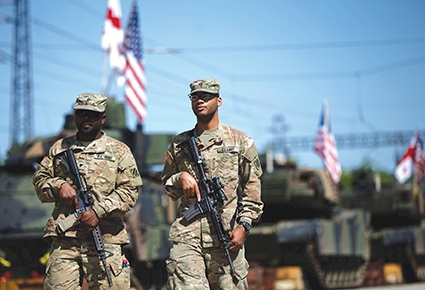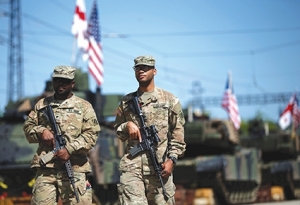American Military Base Deployment: Opportunities and Challenges for Georgia
On the eve of elections, foreign and defense policy topics have already become dominant and decisive issues for achieving the concrete political objective of getting seats in parliament.
And it’s a battle of two armies – between the sympathizers of the “Good Ole Soviet Union” and the proponents of the shiny new (not exactly near) future with NATO and Europe in general. This trend has been reinforced with the dynamics of “New Cold War” provisions being fought between the West (EU and NATO) and Russia.
So it didn’t come as a great surprise that when Parliament Speaker David Usupashvili and his Republican party voiced their view on the possible deployment of American military bases on Georgian terrain, in fact, it had very sound resonance.
The statement was obviously oriented for local consumption and could be treated as new PR schtick for attracting more of the Georgian electorate, namely those who support pro-Western foreign policy.
It also turned out to be a neat Falcon Punch for the Free Democrats, as this kind of thing has been exclusively their agenda domain in recent years. It was definitely more than just a sample message to probe public opinion and play the US vs Russia card.
Recently, the “red line” of confrontation between the two has rested on two important geostrategic regions – the Baltics and the Caucasus. The importance of these regions is further underlined by both the USA and Russia, as they were implicitly mentioned in the National Security strategies of both super-powers.
For example, the latest National Security Strategy of the Russian Federation, adopted on December 31, 2015 by the President of Russia, mentions the geostrategic importance not only of the Caucasus region but specifically Georgia. In Paragraph 89 of the Strategy Chapter named ‘Strategic Stability and Equal Strategic Partnership,’ the Kremlin incumbent authority declares the occupied territories of Abkhazia and South Ossetia as the most vital zones of strategic influence, while in Paragraph 106 it perceives as a military threat any kind of activity or rapprochement of any type of military infrastructure of NATO toward Russia’s state borders, including those in Georgia.
The document has made it blatantly obvious that the Russian government considers the Caucasus region and Georgia in particular as a strategic chokepoint from national security perspectives.
As for the US policy, the Obama Administration in its own strategic document, the National Security Strategy, adopted in February 2015, indicates the importance of strategic relations with Caucasus countries that need to be enhanced to strengthen the US alliance with Europe, including tackling global security challenges and encouraging the resolution of regional conflicts – see the respective chapter of the document, page 25.
Moreover, the Strategy identifies Georgia, Moldova and Ukraine as strategic partners, giving them the status of “pivotal states” (as a side note, one of the leading American experts in security studies and geopolitics, Ariel Cohen, recently defined Georgia as the most strategically important ally).
Stemming from the declarations in the Concept in Chapter: ‘Strengthen Our National Defense,’ it mentioned how the USA could use its military forces and how: “We will be principled and selective in the use of force. The use of force should not be our first choice, but it will sometimes be the necessary choice. The United States will use military force, unilaterally if necessary, when our enduring interests demand it: when our people are threatened; when our livelihoods are at stake; and when the security of our allies is in danger. In these circumstances, we prefer to act with allies and partners.”
Based on that document and considering the fact that in order to protect Allies (and Georgia is thought to be considered as such) theoretically and conceptually the “White House” has accepted the right to use military forces whenever it considers it applicable and provided a legislative basis for that stance, David Usupashvili’s statement from that perspective is not seen as illogical and irrelevant and is not without substance as many might have thought before.
Moreover, Usupashvili, as one of the best experienced and most qualified lawyers, would not have voiced such a statement without having sufficient evidence to back it up.
Therefore, one can assume Georgia is being transformed into a possible model of “divided Germany” as during the Cold War, with the already deployed military forces of Russia in occupied parts of Georgia and possible deployment of American military forces in what is still a sovereign and democratic part of Georgia.
Dr. Vakhtang Maisaia












